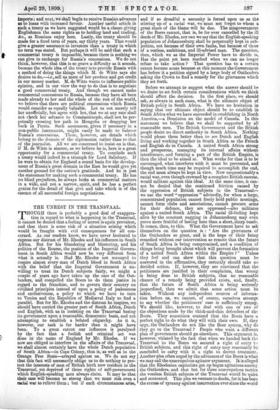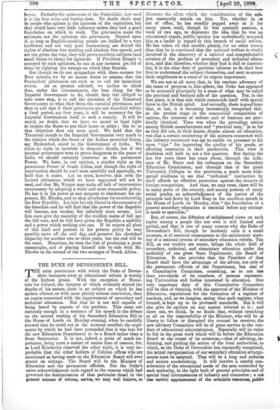THE UNREST. IN THE TRANSVAAL T HOUGH there is probably a
good deal of exaggera- tion in regard to what is happening in the Transvaal, it -cannot be denied that a feeling of unrest is again prevalent, and that there is some risk of a situation arising which would be fraught with evil consequences for all con- cerned. As our readers know, we have never hesitated to express our distrust of Mr. Rhodes and his influence in South Africa. But for his blundering and blustering, and his Politics of the Bourse, the position of the Imperial Govern- ment in South Africa would now be very different from: what - it actually is. Had Mr. Rhodes not managed to inspire almost every man of Dutch blood in South Afric& with the belief that the Imperial Government is un- willing . to • treat its Dutch subjects fairly, we might a couple of years ago have taken up the case of the Out- landers, and 'compelled the Boers to do them justice in regard to the franchise, and to govern their country on civilised principles instead of upon a policy of jealousness and exclusiveness, a policy to which we have to turn to' "Venice and the Republics of Medimval Italy to find a 'But for Mr. Rhodes and the. distrust he inspires, we should lave carried the greater part of South Africa, Dutch and English, With us in insisting on the Transvaal basing its government upon a 'reasonable, democratic basis, and not attempting to establish a belated oligarchy. As it is, however, our task is far harder than it might have been. To a great extent our influence is paralysed by the fact that a foolish and criminal act was done hi the mane of England by Mr. Rhodes. If we now are obliged to interfere in the affairs of the Transvaal, we shall almost certainly have the whole Dutch population of South Africa—in Cape Colony, that is,' as well as in the Orange Free State—arrayed against us. We do not say. that this fact will necessarily oblige us to do nothing to pro- tect the interests of men of British birth now resident in the Transvaal, yet deprived Of those rights of self-government which English-speaking men always claim. It may be that their case will become so strong that- we must risk even a racial war to relieve' them ; but if such circumstances arise, and if so dreadful a necessity is forced upon us as the stirring up of a racial war, we must not forget to whom a great share of the blame will be due. The misgovernment of the Boers cannot, that is, be for ever cancelled by the ill deeds of Mr. Rhodes, nor can we say that the English-speaking population of Johannesburg shall be perpetually kept in sub- jection, not because of their own faults, but because of those of a restless, ambitious, and ill-advised man. The question; then, which we as the Imperial Power have to decide is, Has the point yet been reached when we can no longer refuse to take action?' That question has to a certain extent become acute because at this moment the Government has before- it a petition signed by a large body of Outlanders asking the Crown to find a remedy for the grievances which they set forth.
Before we attempt to suggest what the answer should be we desire to set forth certain considerations which we think should affect the decision. In the first place, We should ask, as always in such cases, what is the ultimate object of British policy in South Africa. We have no hesitation in saying that our ultimate object should be to establish in South Africa what we have succeeded in establishing in North America,—a Dominion on the model of Canada. In this statement we believe that we shall be supported by all reasonable men. The British Government and the British people desire no direct authority in South Africa. Nothing would please them better than to see Dutch and English living and working together in South Africa as the French and English do in Canada. A united South Africa strong and prosperous, managing its internal affairs without interference and forming a part of the British Empire, is then the ideal to be aimed at. What works for that is to be encouraged, what interferes with it must be prevented, and though much time may be required to accomplish the end, the end must always be kept in view. Now unquestionably a racial war, even though crowned by a complete British success, would militate against this ide,al. At the same time it can- not be denied that the continued friction called by the oppression of British subjects in the Transvaal— we use the word " oppression " advisedly, for when a larger concentrated population cannot freely hold public meetings, cannot form clubs and associations, cannot procure arms for their defence, they are oppressed—also militates against a united South Africa. The racial ill-feeling kept alive by the constant nagging in Johannesburg may even prove more fruitful of lasting hate than a short, sharp tussle. It comes, then, to this. What the Government have to ask themselves on the question is : Are the grievances of the Outlanders so great, and is the hope Of their being remedied without our intervention so remote that the future of -South Africa is being compromised, and a condition of things being brought. about which will prevent the formation of a united South Africa within the Empire ? ' Unless they feel and can show that this question must be answered in the affirmative, they certainly should take no decided action. If, however, they are convinced that the petitioners are justified in their complaints, that wrong is being done to British subjects, that no reasonable chance of a remedy being provided exists, and, finally, that the future of South Africa is being. seriously jeopardised, then we admit that some action must be taken. Without any independent sources of informa- tion before us, we cannot, of course, ourselves attempt to say whether the petitioners' case is sufficiently streng. We should like, however, to deal with one or two of the objections made by the thick-and-thin defenders of the Boers. They sometimes contend that the Boers have .a perfect right to do what they will with their own. . If, they urge, the Outlanders do not like the Boer system, why do they go to the Transvaal ? People who want a different plan of government should go elsewhere. This argument is, however, vitiated by the fact that when we handed back the Transvaal to the Boers we secured a right of .entry to British subjects, and this right of entry may reasonably be concluded to easy with it a right to, decent treatment. Another plea often urged by the advocates of the Boers is what we may call the unscrupulous agitator argument. Ibis alleged that the Rhodesian capitalists get up bogus agitations among the. Outlanders, and that but for these unscrupulous tactics the voteless British subjects of the Transvaal would be 'quiet and contented. This plea we venture to doubt, for it has been the excuse of tyranny against insurrection ever since the world began. Probably the aristocrats of the Palteolithic Age used it at the first roots and berries riots. No doubt there may be people who agitate in the interests of the capitalists, but they would have very little influence unless they had a good foundation on which to work. The grievances make the agitators, not the agitators the grievances. Depend upon it, as long as English-speaking people are bullied by a very inefficient and not very pure bureaucracy, are denied the rights of absolute free meeting and absolute free speech, and are not given the vote, they will prove excellent subjects (and small blame to them) for agitators. If President Kruger is annoyed by such agitators, he can at any moment get rid of them by righting the wrongs on which they flourish. But though we do not sympathise with, these excuses for Boer misrule, we by no means desire to assume that the Outlanders' grievances are such as to call for immediate action. As at present advised, we incline to think that, under the circumstances, the best thing for the Imperial Government to do, should they feel obliged to take some step, is to call the attention of the Transvaal Government to what they deem the essential grievances, and then to add that if these grievances are not remedied within a fixed period, say four years, it will be necessary for the Imperial Government itself to seek a remedy. It will be urged, no doubt, that we have no moral or legal right to require the Boers to put their house in order ; but to us that objection does not seem good. We hold that the Transvaal stands to the Imperial Government very much in the relation which the freest of the Indian protected States, say Hyderabad, stand to the Government of India. We claim no right to interfere in domestic details, but if the internal government were to prove dangerous to the peace of India we should certainly intervene as the paramount Power. We have, in our opinion, a similar right as the paramount Power of South Africa, and though the right of intervention should be used most carefully and sparingly, we hold that it exists. Let us trust, however, that even the limited ultimatum which we have suggested will not be used, and that Mr. Kruger may make all talk of intervention unnecessary by adopting a wiser and more reasonable policy. He has it in his power at any moment to checkmate his op- ponent, Mr. Rhodes, and to stop all schemes for overthrowing the Boer Republic. Let him be only liberal in the extension of the franchise and he will find that the power of the Republic will become, not weaker, but infinitely more secure. Let him once give the majority of the resident males of full age the full vote, and he will have given the Republic a stability and a power which nothing else can. If he rejects all pleas of this kind and persists in his present policy he may possibly stave off the evil day, and preserve his cherished oligarchy for another two or three years, but the end will be the same. Meantime, he rims the risk of producing a great catastrophe, and of placing himself side by side with Mr. Rhodes as the second of the two scourges of South Africa.























































 Previous page
Previous page